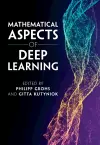
Mathematical Aspects of Deep Learning
2 contributors - Hardback
£73.00
Prof. Dr. Philipp Grohs was born on July 7, 1981 in Austria and has been a professor at the University of Vienna since 2016. In 2019, he also became a group leader at RICAM, the Johann Radon Institute for Computational and Applied Mathematics in the Austrian Academy of Sciences in Linz. After studying, completing his doctorate and working as a postdoc at TU Wien, Grohs transferred to King Abdullah University of Science and Technology in Thuwal, Saudi Arabia, and then to ETH Zürich, Switzerland, where he was an assistant professor from 2011 to 2016. Grohs was awarded the ETH Zurich Latsis Prize in 2014. In 2020 he was selected for an Alexander-von-Humboldt-Professorship award, the highest endowed research prize in Germany. He is a member of the board of the Austrian Mathematical Society, a member of IEEE Information Theory Society and on the editorial boards of various specialist journals.
Martin Holler was born on May 21, 1986 in Austria. He received his MSc (2010) and his PhD (2013) with a "promotio sub auspiciis praesidentis rei publicae" in Mathematics from the University of Graz. After research stays at the University of Cambridge, UK, and the Ecole Polytechnique, Paris, he currently holds a University Assistant position at the Institute of Mathematics and Scientific Computing of the University of Graz. His research interests include inverse problems and mathematical image processing, in particular the development and analysis of mathematical models in this context as well as applications in biomedical imaging, image compression and beyond.